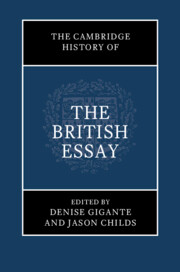Book contents
- The Cambridge History of the British Essay
- The Cambridge History of the British Essay
- Copyright page
- Contents
- Illustrations
- Contributors
- Acknowledgements
- Preface to a History in the Manner of an Essay
- Part I Forming the British Essay
- Part II The Great Age of the British Essay
- Part III Assaying Culture, Education, Reform
- 20 The Essay and the Theme
- 21 The Academic Essay: Rhetoric and Pedagogy
- 22 The Essay and the Rise of University English
- 23 Victorian Essays in Criticism
- 24 Nineteenth-Century Reviews Reviewed
- 25 Essays in the ‘Golden Age’ of the British Newspaper
- 26 The Essay in the Age of Chartism
- 27 Political Theory and Ethics in the Victorian Essay
- 28 Plain English: Essays and Analytic Philosophy
- Part IV Fractured Selves, Fragmented Worlds
- Part V The Essay and the Essayistic Today
- Book part
- Bibliography
- Index
21 - The Academic Essay: Rhetoric and Pedagogy
from Part III - Assaying Culture, Education, Reform
Published online by Cambridge University Press: 31 October 2024
- The Cambridge History of the British Essay
- The Cambridge History of the British Essay
- Copyright page
- Contents
- Illustrations
- Contributors
- Acknowledgements
- Preface to a History in the Manner of an Essay
- Part I Forming the British Essay
- Part II The Great Age of the British Essay
- Part III Assaying Culture, Education, Reform
- 20 The Essay and the Theme
- 21 The Academic Essay: Rhetoric and Pedagogy
- 22 The Essay and the Rise of University English
- 23 Victorian Essays in Criticism
- 24 Nineteenth-Century Reviews Reviewed
- 25 Essays in the ‘Golden Age’ of the British Newspaper
- 26 The Essay in the Age of Chartism
- 27 Political Theory and Ethics in the Victorian Essay
- 28 Plain English: Essays and Analytic Philosophy
- Part IV Fractured Selves, Fragmented Worlds
- Part V The Essay and the Essayistic Today
- Book part
- Bibliography
- Index
Summary
This chapter shows the essay’s troubled evolution as an academic genre in the nineteenth century, from the norms of classical rhetoric taught in English schools to the professionalising educational practices of Scottish universities and their American counterparts. Aimed to introduce meritocracy to Oxford and Cambridge’s class preferment system, the rise of essay-based public examinations in the 1850s reshaped the academic essay to sustain an informational mastery of the complexities of British imperial rule. Professors of English reacted to the new public-exam essay regime with one of two tactics. One was to strip the essay down to a managerial model that came to be known as the five-paragraph essay, shorn of classical figurality and stressing correct usage. Meanwhile, advocates of liberal education revived the teaching of the literary essay based on Victorian models, setting up a lengthy dispute in the twentieth century between literary and social-scientific protocols of essay writing.
Keywords
- Type
- Chapter
- Information
- The Cambridge History of the British Essay , pp. 309 - 324Publisher: Cambridge University PressPrint publication year: 2024

